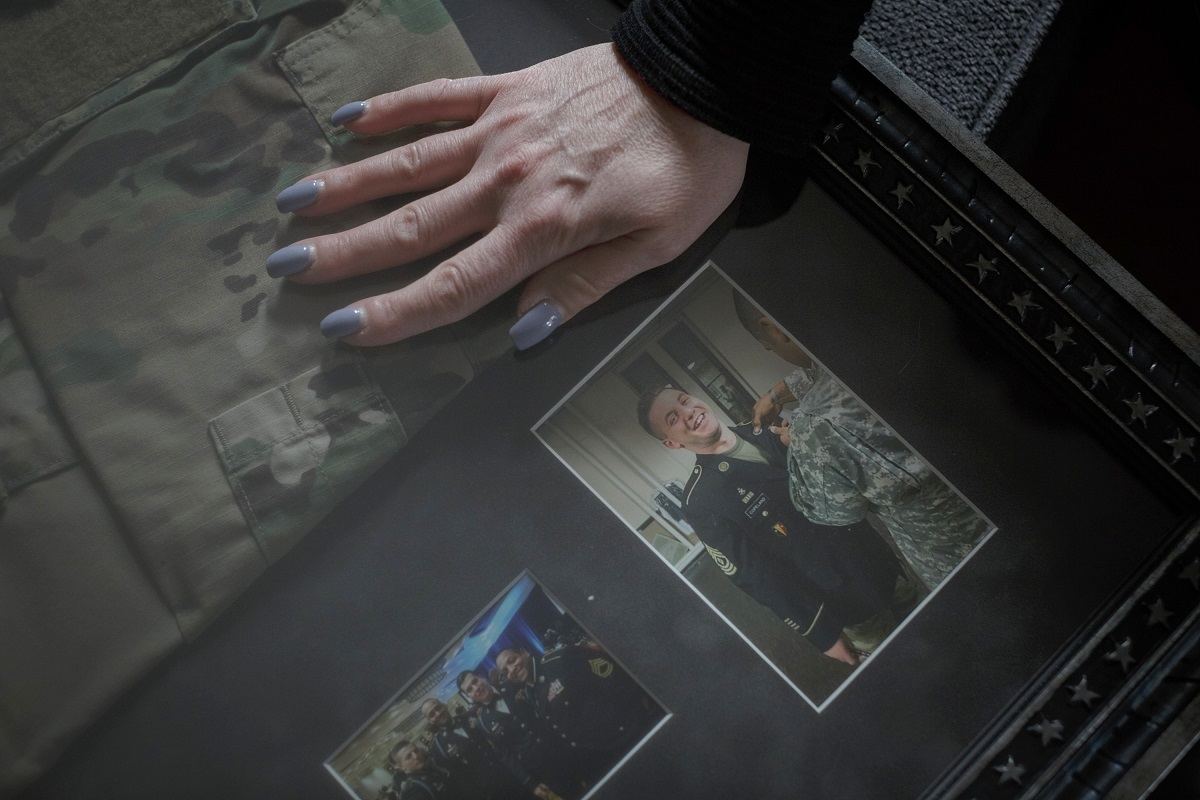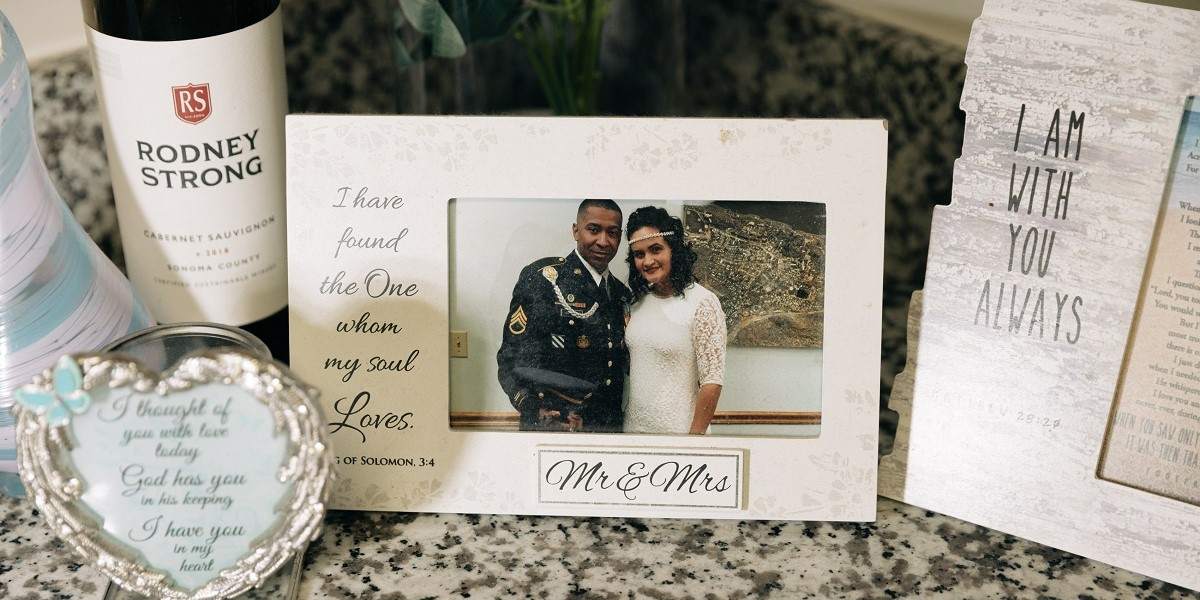
Sharon Hartz shows a frame the military gave her after her son died.
12:59 JST, February 28, 2023

Natasha Bevard with a photo of her late husband, Rodney C. Bevard.
Natasha Bevard looked at the pile of unopened financial statements and felt a sense of dread swell within her. She knew what they were going to say.
Her husband, Rodney C. Bevard, was a career soldier who died by suicide in 2020. In the anguished, vulnerable days that followed, the Army appointed a financial counselor, Caz Craffy, to help make sense of the life insurance funds paid to his family.
Bevard, 42, had entrusted Craffy with about $370,000 to invest conservatively, she said, hoping the money would grow modestly over time. She did not want to gamble with the stock market.
But Bevard suspected something was wrong. And after investigators contacted her to ask about Craffy, she thought back to a text message he once sent: “DON’T LOOK AT ANY STATEMENTS.”
She tore into one of the envelopes. Then another. And another. The balance had plunged by six figures. “What hurt me the most,” she said, is that “these were the kids’ accounts.”

A wedding photo of the Bevards is seen at their home in New York.
In interviews with The Washington Post, four military families accused Craffy of going far beyond his duties as an Army civilian employee by taking direct control of their life insurance money through brokerage firms where he also was employed. Combined, their accounts are down $750,000, according to Natalie Khawam, an attorney for three of the families, and Marc Fitapelli, who is representing the fourth survivor.
The families, all of whom live in the northern New Jersey and greater New York City area, allege that Craffy leveraged his Army position to generate clients, exploiting their grief before strip-mining their accounts through trades that earned him commissions of up to $4,500, often executed, they say, without their consent or consultation.
The commissions ate into their balances along with losses that piled up as the investment funds, in some cases, dramatically lost value. Such losses can be recouped only if the holdings perform better.

Army financial adviser Caz Craffy gives a Thanksgiving greeting from Iraq in 2009.
Craffy – who also goes by the name Carz Craffey, according to public records – did not return multiple messages seeking comment. It is unclear whether he has retained legal counsel. His attorney in an unrelated civil case declined to comment.
As the families seek to recoup their losses through litigation, their cases have alarmed observers and financial experts who say the episode appears to have exposed glaring oversight failures within the Army while underscoring the need for far greater accountability over those advising the recipients of such vast sums of money in moments of crisis. The faith these families placed in the Army, they said, appears to have been abused.
“The Army certainly should have been aware this person was working two full-time jobs,” said Katherine L. Kuzminski, a military policy expert at Center for a New American Security, emphasizing that it is the service that is responsible for guaranteeing that life insurance beneficiaries “receive ethical treatment.” Financial counseling is a good idea, in theory, she added, but only if the highest standards can be enforced “to ensure families, who financial advisers are set up to protect in the first place, are truly protected and not taken advantage of.”
This account is based on interviews with Craffy’s former clients and colleagues, text messages he exchanged with life insurance beneficiaries, independent assessments of their account statements and a summary of action taken against him by the Financial Industry Regulatory Authority (FINRA).
The families said that agents with the Army’s Criminal Investigation Division have asked them about their interactions with Craffy, and two have spoken to officials with the Securities and Exchange Commission. Spokespeople for both agencies said that, as a matter of policy, they could neither confirm nor deny the existence of any investigations.
Craffy’s Army employment ended Jan. 4, said Matt Leonard, a spokesman for the service. Leonard declined to address whether Craffy was removed for suspected misconduct, citing privacy laws, but said Craffy’s alleged actions have spurred an internal review to ensure that Army financial counselors are complying “with ethical standards required by law, policy, and their professional certifications.”
Their duties, Leonard said, “do not include recommending or choosing specific investments and investing money.” Rather, their job is to “educate and support their clients on their benefits and estate planning needs.”
Robert Meyer, the chief executive of New Jersey-based Monmouth Capital Management, which employed Craffy until November, said he was unable to speak about Craffy because Meyer was “not involved in the day-to-day operations” there.
The Servicemembers’ Group Life Insurance program is administered by the Department of Veterans Affairs, not the Department of Defense. Payments typically amount to $400,000, plus another $100,000 to help families cover immediate expenses and loss of income. More than $618 million was paid to SGLI beneficiaries last year, VA said in a statement.
VA, through a government contractor, also provides financial literacy assistance for beneficiaries, raising questions among some military advocates as to why the Army provides a duplicative service. Leonard, the Army spokesman, said that its financial counselors provide more support than VA, including coordination with other resource offices, “to ensure the needs of the survivor are met.”
Last year was historically bad for investors, with inflation and the war in Ukraine contributing to the worst performance of the S&P 500 index since the 2008 financial crisis. And while brokers commonly advise clients in erratic trading periods not to dwell on individual losses or statements, the families suspect their losses go beyond market volatility, accusing Craffy of concealing some activities and downplaying the risks associated with the investments he recommended.
Khawam is preparing to file a lawsuit against Craffy and businesses associated with him, she said. Fitapelli, in a Feb. 6 filing with financial regulators, accused Craffy of “churning,” or unlawful trading to rack up commissions. The claim, filed against Monmouth Capital Management and another of Craffy’s former employers, alleged he mishandled the investment funds of a man whose wife died while serving in the Army Reserve. He lost at least $150,000, the claim said.
The Post asked an independent personal finance expert, Carolyn McClanahan, to review dozens of pages from the families’ account statements showing trades Craffy made over two-plus years. She said the documents point not only to a pattern of churning but also to risky purchases of speculative assets, including cryptocurrency and hyperinflated “meme stocks” GameStop and AMC. Taken together, McClanahan said, the activity shows the fundamental failures of a broker to put the investors’ best interests first.
McClanahan, a certified financial planner who founded the fee-only Life Planning Partners in Jacksonville, Fla., said the purchase, in one instance, of a single asset for $161,000 was particularly troubling because it represented a substantial portion of the account, an affront to the concept of risk management and diversification.
“That is negligence,” she said. That purchase lost more than 90 percent of its value, or about $147,000, according to the families’ statements.
It is common for brokers to discuss strategies and risk tolerance with their clients, including how to navigate market peaks and valleys, then draft that into a policy document, McClanahan said. Khawam’s clients said they had verbal conversations with Craffy during which they expressed their desire for a conservative approach.
“When you hire an investment person, you’re hiring their philosophy,” McClanahan said. “No adviser who is working in a client’s best interest is going to buy some meme stocks.”
Sharon Hartz, whose son, Sgt. Thomas F. Anastasio, died in January 2019, said the life insurance money her family received helped them to cope with his loss. The Army had been “amazing” after her son’s death, she said, and Craffy appeared to be one of many resources for the family to access.
Hartz, 57, said she met Craffy days after her son’s funeral, and they became friends. He even invited her to his wedding, she recalled, but today, after her life insurance investment accounts are down $200,000, she is filled with regret. “It’s unimaginable,” she added. “He disrespected me. He disrespected my son. My family.”

Sharon Hartz and her daughter Morgan Hartz at home in New Jersey.
FINRA, a nongovernmental body that oversees broker-dealers, launched its investigation of Craffy in November in response to a customer complaint, documents released by the organization show. FINRA “sought to investigate, among other issues, Craffy’s potential conversion of customer money, loans or gifts from customers, active trading in customer accounts, and failure to fully disclose certain OBAs,” or outside business activity.
Craffy “refused to produce information and documents” for FINRA and did not sit for an interview, the document says. It does not disclose the investigation’s findings, and a FINRA spokesman declined to comment.
The document, which is signed by Craffy, does not contain an admission or denial of wrongdoing. It does strip Craffy of his FINRA certification, precluding him “from acting as a broker or otherwise associating with a broker-dealer firm.” He was fired from Monmouth for failure to disclose outside business activity, according to FINRA, an action that came a day after FINRA requested documents and information from him.
Craffy’s government duties, along with his other job as a broker, presented inherent conflicts of interest that the Army should have noticed, the families said. Craffy was hired full time as an Army civilian in 2017, Leonard said, when he was already working as a broker at another firm, according to his FINRA page and former colleagues.
“Craffy did not report his other civilian employment to the Army, and the Army did not learn about any other employment until after reviewing a complaint about his actions from a family member,” Leonard said. That occurred in the fall.
There are about 36 employees within the Army that provide financial counseling to survivors, Leonard said. Those in Craffy’s role are required to fill out annual disclosure forms to ensure they do not have financial conflicts of interest. Those documents are reviewed by a supervisor and an ethics counselor, he said.
They “are to be taken at ‘face value’ unless there is a patent omission or ambiguity or the official has independent knowledge of matters outside the report.” Filers who falsify or omit details for the reports, he said, are “subject to adverse action, to include discipline, civil penalties, and/or criminal prosecution.”
John Buzzetta, a branch office manager who oversaw Craffy at the firm Black River, said he never had any suspicions over Craffy’s conduct or trading patterns. A handful of accounts seemed to be related to military life insurance payouts, Buzzetta said, which he figured was related to Craffy’s work as a part-time officer in the Army Reserve.
Craffy’s job as a broker was a full-time position, Buzzetta said, and he had no indication Craffy held a second job as an Army financial counselor for years. Regulations require disclosure of any outside employment, he said, even if they work as delivery drivers on the weekends.
“To have another life, and not tell us,” Buzzetta said, “how does the military not figure it out after so many years?”
Text exchanges illustrate how each family appeared to trust that Craffy was acting in their best interests. He was charismatic, they said, and showed them empathy that, in retrospect, they have begun to question.
Families interviewed by The Post said the life insurance payment process is a jarring experience that comes at a time when suspicious activity may be hard to notice. Craffy would first speak with them over text or from his Army email address before moving, over a period of days or weeks, to business accounts for Monmouth and Overwatch Global Strategies, a separate financial firm he started, his messages show.
“At that time, it didn’t look strange to me,” Bevard said. “I trusted that this was the process. … I felt he cared.” Her husband served in the Marine Corps before putting in 20 years with the Army, according to service records, tenure that included a deployment to Iraq. When he took his life, she said, scores of veterans and soldiers sent her messages on social media to say how he quietly helped them through their own struggles.
Seven months later, Craffy asked Bevard about investment account checks he wanted her to mail. “My job is a little impossible when being a single parent. Just trying to find my routine,” Bevard replied, apologizing for the delay. Craffy reassured her. “You’ll do it and adjust but in due time,” he replied. “One day at a time.”
A woman who lost her brother, an Army mechanic, in a traffic collision said her family was overcome with grief when they met Craffy. Her mother, who does not speak English, would recoil whenever he brought up investment options, she said, showing discomfort with the topic so quickly after her son’s death.
“I felt like he used that vulnerability,” she said, describing her role as an interpreter between her mother and Craffy and speaking on the condition of anonymity to protect her family’s privacy. The family has lost about $220,000 of the life insurance payout through her dealings with Craffy, she said.
In December 2021, as the market experienced a third consecutive year of growth, Craffy suggested their losses were due at least in part to the coronavirus pandemic.
“Don’t have mom look at anything!!!!” he texted.
The families said this experience has upturned their lives and violated the final wishes of their loved ones. Hartz said her son made changes to his life insurance policy when faced with a prospect of death during a deployment. He directed the money to her, she said, to ensure she would help take care of his siblings.
“That was his plan, and Caz took that from him,” she said. “And I feel like I failed him by allowing it to happen.”
Top Articles in News Services
-

Survey Shows False Election Info Perceived as True
-

Hong Kong Ex-Publisher Jimmy Lai’s Sentence Raises International Outcry as China Defends It
-

Japan’s Nikkei Stock Average Touches 58,000 as Yen, Jgbs Rally on Election Fallout (UPDATE 1)
-

Japan’s Nikkei Stock Average Falls as US-Iran Tensions Unsettle Investors (UPDATE 1)
-

Trump Names Former Federal Reserve Governor Warsh as the Next Fed Chair, Replacing Powell
JN ACCESS RANKING
-

Producer Behind Pop Group XG Arrested for Cocaine Possession
-

Japan PM Takaichi’s Cabinet Resigns en Masse
-

Japan Institute to Use Domestic Commercial Optical Lattice Clock to Set Japan Standard Time
-

Man Infected with Measles Reportedly Dined at Restaurant in Tokyo Station
-

Israeli Ambassador to Japan Speaks about Japan’s Role in the Reconstruction of Gaza
























